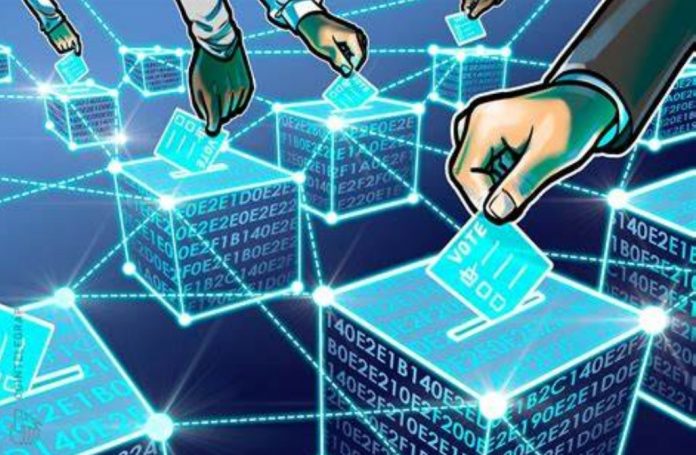The blockchain is bringing true democracy by revolutionizing the voting system in democratic countries worldwide by making it decentralized and eliminating intermediaries. Some experts claim that Bitcoin is a successful digital currency that has demonstrated to be the future of money, so you should be familiar with the step-by-step guidelines for trading it.
Blockchain democratization is setting up a level playing field for every citizen to cast their vote on any issues that are important to them – whether for country voting for their congressman, municipal voting on taxes or candidates, school board elections at home, or online shopping choices.
It is a change that every individual citizen in these countries can vote on and one that will enable them to gain power and honestly vote for the person that is best for their country. The blockchain is a technology that runs on a decentralized peer-to-peer system, where votes are cast on the blockchain. There is no manual intervention from any banks or government entities whatsoever.
Blockchain democratizes the voting process and makes it better for every corner of the world. Blockchain democratization allows voting to be a solid choice for each citizen in democratic countries.
Blockchain enables true democracy:
Blockchain enables true democracy because it does not discriminate against any race, religion, age, or socioeconomic status. With the blockchain powering these election platforms, these generations can use their smartphones to cast their votes instead of going to the polls on Election Day.
The blockchain is a technology that gives every person and every vote their day in the sun. The blockchain can be accessed by anyone, anywhere around the world, and it can, most importantly, bring them their true democracy and put in their power. True democracy is when each person has an equitable voice in determining how their country votes for taxes, who gets elected as a local politician, or how much price change will be for one’s favorite product on the shelf at Wal-Mart.
Blockchain Serves the Voters:
Blockchain can solve the many problems discovered in these early attempts at online voting. For example, in Estonia’s online voting system, the internet was cut off to a large part of the country by a significant cyberattack. In South Korea, when the internet was cut off to those attempting to vote in this online election, polling stations opened up for those who could not access it.
In the U.S., 44 million voter registrations are labeled as ‘invalid or significantly inaccurate,’ With blockchain democratization, there is no need for manual intervention from any banks or government entities.
Voter registration would be instantaneous and secure with blockchain democratization, and each new voting candidate in power would be immediately registered on the chain when they were elected into office. The blockchain will keep track of every vote and ensure people are not voting twice. With blockchain democratization, voters can feel safe and secure in their vote, knowing their voice is being heard.
Practical Challenges:
Online Voting:
The first attempts at online voting were a massive success for those governments who practiced this form of voting. However, many problems arose during these elections, with internet access cut off for large groups of citizens and significant cyber-attacks on the websites where citizens could vote.
Private Censorship:
Private censorship is among the most significant issues with online voting regarding immigration policies or free speech laws in other countries. Private censorship significantly impacts these voting systems when one person or corporation can shut down an entire website and stop their citizens from voting. As a result, these corporations can have their political agenda and have complete control over their country’s elections. With blockchain democratization, there is no need for private censorship with the existence of the blockchain: votes are cast on the chain and cannot be tampered with or manipulated by any foreign source.
Blockchain Democratization is Revolutionizing Democracy:
The blockchain is revolutionizing democracy by finally making it real and enabling true power to be in the hands of every individual citizen. The blockchain allows everyone in a democratic country to vote for who will represent them, and each vote will matter. Blockchain democratization brings us closer to true representative democracy when citizens can genuinely determine how their country votes on taxes, policy changes, and elections. With the combination of online voting and blockchain democratization, we can see an even more democratic future ahead of us.
Bringing Elections into the 21st century:
The blockchain democratization of voting is finally bringing elections into the 21st century and moving on from archaic technologies like physical voting, paper ballots, and power brokers who have owned Washington for so long. Blockchain democratization will bring us closer to true representative democracy when citizens can genuinely determine how their country votes for taxes, policy changes, and elections. With more than 44 million invalid voter registrations in the United States alone, the blockchain has a huge opportunity in this space to ensure that each person has total power over their voice and that no votes are tampered with. Blockchain democratization will take our democracy from being outdated to one of the most advanced in the whole world.
Disclaimer: This article contains sponsored marketing content. It is intended for promotional purposes and should not be considered as an endorsement or recommendation by our website. Readers are encouraged to conduct their own research and exercise their own judgment before making any decisions based on the information provided in this article.



































